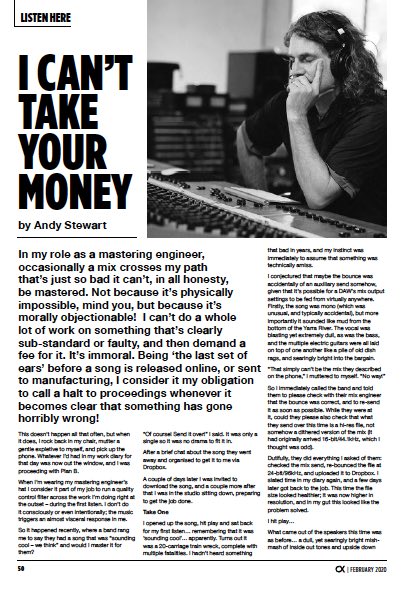News
15 Feb 2020
I Can’t Take Your Money

Subscribe to CX E-News
I Can’t Take Your Money
In my role as a mastering engineer, occasionally a mix crosses my path that’s just so bad it can’t, in all honesty, be mastered. Not because it’s physically impossible, mind you, but because it’s morally objectionable! I can’t do a whole lot of work on something that’s clearly sub-standard or faulty, and then demand a fee for it. It’s immoral. Being ‘the last set of ears’ before a song is released online, or sent to manufacturing, I consider it my obligation to call a halt to proceedings whenever it becomes clear that something has gone horribly wrong!
This doesn’t happen all that often, but when it does, I rock back in my chair, mutter a gentle expletive to myself, and pick up the phone. Whatever I’d had in my work diary for that day was now out the window, and I was proceeding with Plan B.
When I’m wearing my mastering engineer’s hat I consider it part of my job to run a quality control filter across the work I’m doing right at the outset – during the first listen.
I don’t do it consciously or even intentionally; the music triggers an almost visceral response in me.
So it happened recently, where a band rang me to say they had a song that was “sounding cool – we think” and would I master it for them?
“Of course! Send it over!” I said.
It was only a single so it was no drama to fit it in. After a brief chat about the song they went away and organised to get it to me via Dropbox.
A couple of days later I was invited to download the song, and a couple more after that I was in the studio sitting down, preparing to get the job done.
Take One
I opened up the song, hit play and sat back for my first listen… remembering that it was ‘sounding cool’… apparently.
Turns out it was a 20-carriage train wreck, complete with multiple fatalities. I hadn’t heard something that bad in years, and my instinct was immediately to assume that something was technically amiss.
I conjectured that maybe the bounce was accidentally of an auxiliary send somehow, given that it’s possible for a DAW’s mix output settings to be fed from virtually anywhere.
Firstly, the song was mono (which was unusual, and typically accidental), but more importantly it sounded like mud from the bottom of the Yarra River.
The vocal was blasting yet extremely dull, as was the bass, and the multiple electric guitars were all laid on top of one another like a pile of old dish rags, and searingly bright into the bargain.
“That simply can’t be the mix they described on the phone,” I muttered to myself. “No way!”
So I immediately called the band and told them to please check with their mix engineer that the bounce was correct, and to re-send it as soon as possible.
While they were at it, could they please also check that what they send over this time is a hi-res file, not somehow a dithered version of the mix (it had originally arrived 16-bit/44.1kHz, which I thought was odd).
Dutifully, they did everything I asked of them: checked the mix send, re-bounced the file at 24-bit/96kHz, and uploaded it to Dropbox. I slated time in my diary again, and a few days later got back to the job.
This time the file size looked healthier; it was now higher in resolution, and in my gut this looked like the problem solved. I hit play…
What came out of the speakers this time was as before… a dull, yet searingly bright mish-mash of inside out tones and upside down volumes, all resplendent in their monophonic glory! It was the same exact disaster as before.
What came out of the speakers this time was as before… a dull, yet searingly bright mish-mash of inside out tones and upside down volumes
This was getting ridiculous. So I stopped work and rang the band… again!
This time I was more assertive and explicit about my requirements, as well as my suspicions. They listened to my polite rantings, reacted swiftly and re-sent the mix… again.
This time the file was 64-bit/32kHz floating (or something), which piqued my curiosity again, and not in a good way. “Why is the file size growing each time like mould on an old tin of tomato paste?” I wondered. “That seems really odd.”
I wasn’t liking these small technical surprises, and my suspicions were once again raised.
This time I steeled myself for what I was about to hear… And sure enough… a train wreck: mono, sounding like garbage, and stupidly high res into the bargain!
WTF is Wrong This Time!?!
I was getting cranky now. I had entered this job into my diary three times, all for a piddling amount of money, which had – if I were to be hard-nosed about it – already been spent twice over without even starting!
I rang the band… AGAIN! At this point I’m not sure who was getting more sick of hearing from whom: the band, the mix engineer, or me. All I knew was that, in preparation for this next conversation, the gloves were coming off.
“Hey there again guys,” I started out, knowing full well that they knew my calling so soon must not be a good sign.
“Bad news I’m afraid… it’s still sounding like garbage at my end, but given that this is our third attempt at a solution, I think it’s probably time I spoke directly to the mix engineer. Do you have his number?”
“Yep, we’ll text it to you right now.” Which they did…
Moments later I rang the engineer (whose name I didn’t know) directly on his mobile.
“Hey Fred,” I said, “It’s Andy Stewart here, I’m mastering…”
“Hey Andy, great to talk to you man,” he interrupted.
Fred started on a bit of chit-chat rant about mixing, and my Mill studio, and who knows what else… but I quickly turned the conversation on to his mix of the single in question.
“I just wanted to ring you to triple-check a few things,” I said, “to eliminate any technical problems we might be inexplicably having somehow.”
I was trying to be polite yet assertive (I had already wasted so much time on this song that I didn’t have another hour to waste on pleasantries with a fellow engineer.)
“Yeah man, fully understand. What seems to be the problem?”
Without wanting to launch into a tirade about how abominably awful the song sounded, and still holding onto a shred of hope that the song had a DAW-related bounce problem somehow, I stayed cool and talked plainly with Fred about what I was hearing at my end.
“I just wanted to check for starters about the issue of the song apparently being mono. Is it possible that I’m getting a folded-down version of the mix somehow?”
“Nah man, it’s stereo. Definitely.”
“Well, that’s weird,” I said. “Because it sounds virtually mono at this end, and the goniometer on my console confirms it.
“So are you saying that things like the big electric guitars are wide left and right in the stereo mix?”
“Nah man, they’re all mono… I was going for a mono vibe on the guitars. The only thing that’s stereo are the overheads, but they’re hard left and right.”
“Riiiight,” I said, trying to conceal the hesitation in my voice.
“So only the overheads on the drums are, in fact, mono, yeah?”
“That’s it!”
Suddenly the penny dropped. What this guy was now telling me about his mix made me realise that A: we did not have a technical issue here, but rather a mix problem, and B: clearly Fred didn’t know what the hell he was doing!
“So how many guitars are in the mix Fred… I can’t tell?”
“About nine or 10, some of which are acoustics.”
“Oh right, okay, I’ve not noticed the acoustics in there but I’ll double check that now and get back to you… thanks for your time Fred.”
Click.
Ring Ring
I rang the band… unfortunately for them, they answered! I proceeded to do something I have only done a handful of times under very rare circumstances. I threw Fred under the bus.
Sorry Fred.
No offence was intended towards Fred, of course. I simply couldn’t stand by and let this band release Fred’s so-called mix of their single with it sounding so breathtakingly bad.
Nor could I put my mastering engineer’s name on such a train-wreck. I was simply acting to avert disaster for a client that I was, at some point, intending to invoice.
“You guys need to remix this song with anyone else, frankly. This mix won’t fly in its current form, and I suspect it needs to be revisited from scratch.
“I could do it; virtually anyone else I know could do it. It certainly doesn’t have to be me,” I said, knowing full well I had just dobbed myself in for a job I really didn’t want.
And yep, I remixed it, and it sounds pretty cool now. One thing’s for sure, it’s wider!
Andy Stewart owns and operates The Mill on Victoria’s Bass Coast. He’s a highly credentialed producer/engineer who’s seen it all in studios for the last three decades. He’s happy to respond to any pleas for recording or mixing help… contact him at: andy@themill.net.au
Lead image courtesy The Mill.
CX Magazine – February 2020
LIGHTING | AUDIO | VIDEO | STAGING | INTEGRATION

Entertainment technology news and issues for Australia and New Zealand
– in print and free online www.cxnetwork.com.au
© VCS Creative Publishing
Subscribe
Published monthly since 1991, our famous AV industry magazine is free for download or pay for print. Subscribers also receive CX News, our free weekly email with the latest industry news and jobs.





